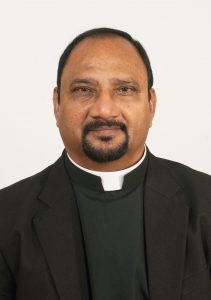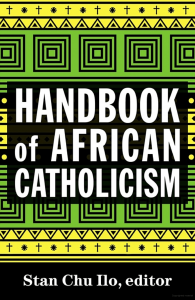Dear Members and Readers,

Just imagine that when Jesus was growing up he must have realized there was some power within him, as he was God Incarnated. At the same time, he was fully human with all the human attributes. Jesus must have experienced an inner struggle time and again. A time came when he set out to search for himself, giving up everything. Long years past in the company of Abba, the Father, His Father, to realize who he is. Once he is fully aware of himself, he comes back to do the will of God. He chooses the Twelve Disciples and invites others to follow him as he starts his journey to Jerusalem. His final destination is Jerusalem and his mission is to receive Glory on the Cross for the salvation of all. There was no turning back. That was his commitment. He chose a few and many aspire to follow him. He makes clear that his discipleship demands a high price. Those who aspire to follow him need to count the cost; have to give up everything. We have taken up this discipleship which demands our commitment to dare and to share.
Mission implies, being with Jesus and being sent out. A disciple of Jesus necessarily needs time to be with Jesus so that he/she can acquire the Abba experience and will feel impelled to proclaim the Good News as Jesus did. Therefore, the core of the mission is to be Christ-Centred. The SEDOS Bulletin carries articles that stress the importance of this core experience: Christ-Centeredness.
In his article, “Jesus: Message and Model of Mission: New Testament Perspectives”, James Kroeger, MM, writes, “As Jesus is the incarnation of God’s love, the disciples become people of charity and signs of ‘God’s love in the world — a love without exclusion or partiality’; they serve as a ‘universal brother’ to all those in need (RM, n. 89).” He gives Scripture references indicating how Jesus was conscious of his unique relationship to the Father and it is he who enables us to have a deep love-relationship with the Father: “As the Father has loved me, so have I loved you; abide in my love” (Jn 15:9). He says, “Empowered by the transforming love of Father, Son, and Spirit, we engage in mission, telling the entire world of God’s love!”
In the article, “Religious Communities of and for the Kingdom of God: George M. Soares-Prabhu’s Vision of Priesthood and Religious Life”, Richard Lopes, SJ, presents the prophetic ideas of Fr. Soares Prabhu, the great theologian of our time. According to Soares Prabhu, the Mission of Jesus, namely bringing the Kingdom of God becomes the responsibility of the Priests and Religious in India. The inevitable outcome of this mandate is the Cross, which “exemplifies and vindicates with absolute assurance the spirituality and the praxis of Jesus, who in his freedom and his love chooses to identify with the weak and the foolish and oppose the wise and the strong. It summons us as followers of Jesus to assume the same spirituality of solidarity and struggle.” Here, he is referring to the Indian context but it is applicable everywhere. He says, “To be religious is to be a witness of Christ. That is the most effective way of professing our faith in Christ and proclaiming the message of the Kingdom. We as religious are called to be ex officio ‘followers of Christ’ as ‘communities of and for the Kingdom’ and that is how our life can be an authentic way of following Jesus.”
In the third article, “Mission in Asia Today: Perspectives and Challenges”, Michael Amaladoss, SJ, writes, “When we speak of mission, we immediately think of the missionaries who go on mission to proclaim the good news and convert people. But the Second Vatican Council, when it speaks about mission, starts with the Church but goes back to Godself. In its Decree on Mission it says, “The Church on earth is by its very nature missionary since, according to the plan of the Father, it has its origin in the mission of the Son and the Holy Spirit” (Ad Gentes, n. 2).

Today, in our religious and missionary life, we find many challenges as the disciples of Jesus, but still there is hope. In the fourth article, “A Vision for the Future of Religious Life”, Teresa Maya, CCVI, brings out the aspect of hope beautifully. She says that in spite of all the problems, the world is facing, it is hope that can restore the whole world. We need to become messengers of hope. And to find hope, we need to be prophetic, and to be prophetic, our lives need to witness to what we believe and who we are. The vision for this kind of prophecy will emerge from the narrative of hope embedded deep in the soul of our respective charisms.
In his article, “Re-Look at the Mission Concept and Missiology”, Jacob Kavunkal, SVD, stresses the need “to return to the original mindset, leaving out the discourse of ‘mission’ and its justification. Rather than missiologists and mission scholars, we need scholars who study the Scriptures, not primarily for teaching and writing about Scripture, but to live it integrally today, attracting many more to that lifestyle. Christians will have to become ‘letters of Jesus Christ’ for all to read.”
The article, “Mission to the Victims of Violence”, by Richard Angolio, SMA, presents the horrific violence against Christians in Nigeria. Such a situation is a big challenge to a disciple. The author presents the beautiful and inspiring examples of disciples, who dare to live their discipleship.
Therefore, being Christ centred, we need to dare to live and bring hope to the lives of others. This is the need of our time. We have nothing to be afraid of as our Master and Leader goes before us. For it is he who says, “Do not be afraid. I am with you always, to the end of the age” (Mt 28:20).
Rev. Dr. John Paul, SVD
Director of SEDOS, Rome.

